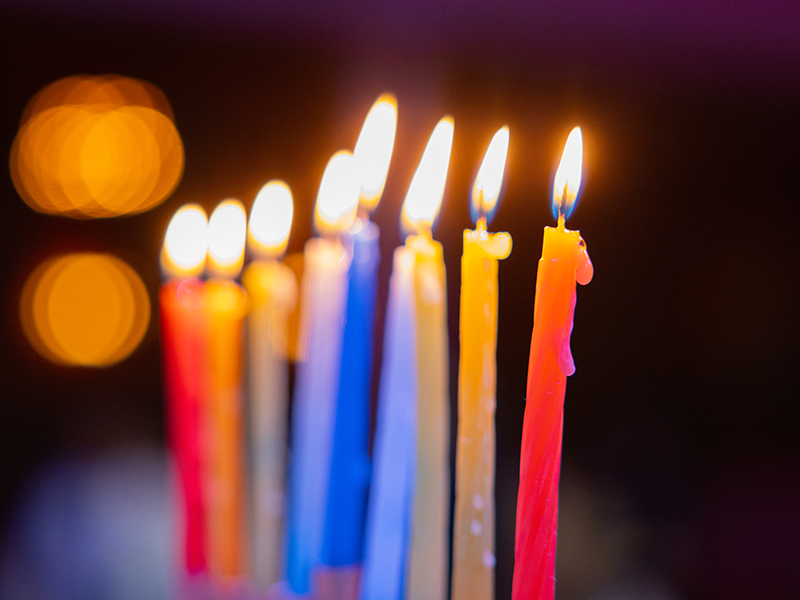
In this week’s parashah, Noach, we hear from Noah’s unnamed wife. She reminds us that it is not easy being one of the women in the Torah. Although these women ensured the future of humanity and of our people Israel, too often they are unnamed, demonized, silenced, or forgotten.
But we can change all that. When we speak their names, and return to them their stories in truth, we reclaim their gifts and we reclaim our truths too.
1. Meet Noah’s wife.
Noah, with his sons, his wife (unnamed), and his sons’ wives (unnamed) came into the ark (Gen. 7:7).
Speak my name, says the unnamed wife of Noah. Five times the Torah mentions me, never by name (Gen. 6:18; 7:7, 13; 8:16,18). I went into the ark with him. We left together. Don’t you imagine we labored together too?
We shared a partnership. Through the rains and the flooding, the feeding and the seed-collecting, the ark-riding and replanting. Together with the Creator, we recreated this world anew.
I am Naamah, daughter of Lamech and sister of Tubal-Cain (Gen. 4:22). My name means pleasing, as my actions were pleasing (ne’imim), as my beauty (some say) was pleasing (B’reishit Rabbah 23:3). I was hidden in the Torah, but recalled by the Rabbis, and chosen by the Merciful One, to be consoler of a new world. Yes, I consoled our sons after they endured Noah’s drunkenness. After Noah cursed them (Gen. 9:20-25).
Still, the Rabbis silenced my contributions, by reimagining me to be an idolater and seducer of men (B’reishit Rabbah 4:22). They said that like Lilith, I harm infants and abuse people in their sleep (Zohar, B’reishit 4:7). Why was it so hard for them to embrace my accomplishments? Speak of me, lest you conspire to silence me too.
I am Naamah. Remember my name.
2. But Naamah is not the first woman of Torah to be silenced.
Male and female, God created them (Gen. 1:27).
Remember Adam’s first wife? Her name is Lilith.
On the sixth day of Creation, God simultaneously co-created Lilith equal with Adam. She was a powerful woman, an autonomous woman, sexually free, in control of her own destiny (Judith Plaskow, The Coming of Lilith). Lilith expected equality, as was hers by design. But when Adam tried to dominate her, she uttered God's secret name and flew away. That first n’keivah (female) disappeared from the Torah text, later supplanted by Eve.
The Rabbis call Lilith a demon, a seducer of men, reimagining her flying off in anger to take your children from their cribs. (Rebecca Lesses, Lilith, Jewish Women’s Archive). Why was it so hard for them to embrace her freedom?
Remember Lilith, as she was – powerful, passionate, sensual, and independent.
3. Even when named, women of Torah are sometimes marginalized.
Abram’s wife Sarai took her slave Hagar the Egyptian and gave her to her husband Abram as a wife. He came to Hagar, ... and she became pregnant (Gen. 16:3-4).
Remember Hagar, concubine-wife of Avram. A strong, loving, protective mother.
Hagar loved her son Ishmael, the child of Abraham. Sent into Abraham’s tent by an infertile Sarai – to fulfill his destiny, to populate a people – Hagar was later sent off by them both into the wilderness with her toddler, when Sarah’s belly finally bore fruit (Gen. 21:9-21).
But Hagar never asked to be bred. That was Sarah and Abraham’s decision. It was God’s decision to save Hagar and Ishmael, giving them bread, blessing, and destiny too.
But the Rabbis then, and rabbis still now, call Hagar the mother of their enemy, so our children fight for eternity like Ishmael and Isaac, who only come together to bury their father (Gen. 25:9). Why is it so hard to remember that Hagar’s future is intertwined with ours, as her great-grandchildren are intertwined with ours?
Tell Hagar’s story. Embrace her kinship. Feel her protective love. And then bring her home, as one who is no stranger at all.
4. For us and all of the women of Torah, let us praise and emulate the Holy One:
Emulate Eim HaChayim,
Mother of All Life,
Wellspring of Humanity,
Shechinah,
Who holds close the women,
And remembers their names—
Naamah, Lilith, Hagar, and
Miriam the prophet, finder of wells, leader of people, and
Rebekah the matriarch, who spoke with God and
Thus insisted that Jacob should lead,
And Mahlah, Noah, Hoglah, Milcah, and Tirzah,
Zelophehad’s daughters,
Who insisted that they too receive their inheritance—
Praised be the Mother of All
Who passes these names down to us,
In Torah, Talmud, and midrash, and
Who expects us to remember them,
And embrace them,
Because the Source of All Life embraces their
Equality and
Partnership and
Imperfection and
Consoling and
Leading and
Independence and
Self-advocacy.
They are our mothers and sisters,
Our wives and friends,
Our past, our present, and our future.
Endowed by our Creator
With undeniable equality,
With blessed uniqueness,
And with infinite value.
May their names be recorded and remembered as blessings for all time.
Praised be the Eternal,
Who remembers each of us in truth.
Rabbi Paul Kipnes, MAJE, a popular lecturer on raising spiritually balanced, emotionally whole children, is leader of Congregation Or Ami in Calabasas, CA. A former camp director and North American Federation of Temple Youth (NFTY) regional advisor, Rabbi Kipnes and his wife Michelle November, MSSW, co-wrote Jewish Spiritual Parenting: Wisdom, Activities, Rituals, and Prayers for Raising Children with Spiritual Balance and Emotional Wholeness (Jewish Lights Publishing).
 In addition to the beautiful and powerful redemption of voices in Rabbi Kipnes’ teaching, there is something else that makes his piece on Parashat Noach deeply moving: a modern male rabbi calling out the historical silencing of female voices. Whenever Rabbi Kipnes writes, “the Rabbis,” he is referring to our tradition’s male commentators, interpreters, and Sages. The same Sages worked to diabolize Esau, saying that when Torah says Esau kissed Jacob and wept on his neck it really meant that Esau tried to bite his brother’s neck; but Jacob’s neck miraculously turned to marble, breaking Esau’s teeth, hence the weeping. Of course! They applied the same imagination and effort to nullifying or vilifying women’s voices. Rabbi Kipnes not only boldly takes issue with this, he also lovingly steps into Naamah, Lilith, and Hagar’s sandals, walks in them, and joins his voice with theirs. Rabbi Kipnes then closes his exploration with a prayer to the Mother of all Life, essentially teaching that the line that once kept women out is no longer; it is not found between us, nor is it found in the heavens.
In addition to the beautiful and powerful redemption of voices in Rabbi Kipnes’ teaching, there is something else that makes his piece on Parashat Noach deeply moving: a modern male rabbi calling out the historical silencing of female voices. Whenever Rabbi Kipnes writes, “the Rabbis,” he is referring to our tradition’s male commentators, interpreters, and Sages. The same Sages worked to diabolize Esau, saying that when Torah says Esau kissed Jacob and wept on his neck it really meant that Esau tried to bite his brother’s neck; but Jacob’s neck miraculously turned to marble, breaking Esau’s teeth, hence the weeping. Of course! They applied the same imagination and effort to nullifying or vilifying women’s voices. Rabbi Kipnes not only boldly takes issue with this, he also lovingly steps into Naamah, Lilith, and Hagar’s sandals, walks in them, and joins his voice with theirs. Rabbi Kipnes then closes his exploration with a prayer to the Mother of all Life, essentially teaching that the line that once kept women out is no longer; it is not found between us, nor is it found in the heavens.
Reading Rabbi Kipnes’s piece brought to mind the argument that Genesis 2:21, which reads “Then, throwing the man into a profound slumber, so that he slept, God Eternal took one of his ribs [tzalotav]…” is a terribly unfortunate translation to use here. For, in other places in Tanakh, forms of the Hebrew word tzeila, are not translated as “rib,” but as “side.”
For example:
Cast four gold rings for it, to be attached to its four feet, two rings on one of its side [tzalo] walls and two on the other side [tzalo] (Ex. 25:12).
As David and his men went along the road, Shimei went along the hill-side (b’tzeila) (II Sam. 16:13).
Imagine how different a world it would be if “rib” was, more correctly, translated as “side”? A world where one is not diminutive of the other, but rather where we are equal parts of one puzzle, and the puzzle is incomplete without us all in it. I would love to see that world.
When we lift and redeem each other’s voices out of the depths, as Rabbi Kipnes does, we begin to create that world. We become like Noah and Naamah, filling our ark with stories and names, lest they be lost to the roiling flood. We become like Naamah and Noah, birthing a new rainbow-colored world.
Rabbi Zoe Klein Miles is a rabbi at Temple Isaiah in Los Angeles, CA.
Noach, Genesis 6:9−11:32
The Torah: A Modern Commentary, pp. 56–91; Revised Edition, pp. 57–83
The Torah: A Women’s Commentary, pp. 35–58
Haftarah, Isaiah 54:1–55:5
The Torah: A Modern Commentary, pp.1,684–86; Revised Edition, pp.1,492–94
Explore Jewish Life and Get Inspired
Subscribe for Emails



